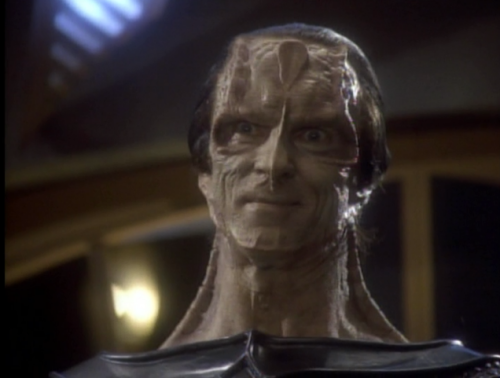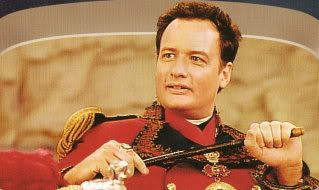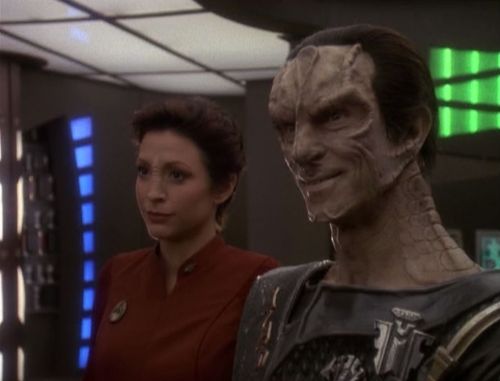Please help me welcome today's guest blogger, A B Potts:
Personal Log
Ensign Jenny Terran
USS Earhart
It was supposed to be a simple assignment. Take one Vulcan delegate back to his homeworld, T'Khasi. No one mentioned the reason why. Pon farr.
As soon as he stepped into the shuttle though, I knew something wasn't quite right. Vulcans don't sweat as such, but his pallor suggested that he should be perspiring, and as he passed me by, he exuded extraordinary warmth. Our Chief Medical Officer, Dr Gates, followed the gentleman in and cast me a knowing glance. A simple nod confirmed to him that I had received the message and understood the situation fully.
Ambassador Sival seated himself with strained Vulcan dignity and closed his eyes in an attempt to shut the world out. Discretely, I lowered the temperature in the cabin a couple of degrees before turning to him.
"Welcome aboard, Ambassador. Can I get you anything before we depart?"
He looked up and I saw he had deep, dark brown eyes. They were unlike any Vulcan's I had ever seen. They were not cool and unyielding, but kindly, yet pained. They spoke of great intelligence and wisdom, so much so that I felt that they had the power to look right inside of me, deep into the very heart of my soul.
"Thank you. No."
Unlike his eyes, his voice was cold, but it wavered somewhat, and I reflected once more upon Vulcan emotions.
People say that Vulcans are without them, but they most certainly are not. Even when they are most in control, they are subject to their feelings, or whatever you wish to call them. They have merely learnt how to contain them, how to harness them. It is their voice that usually gives them away with slight rises and falls in their tones. They are subtle, but they are there. And as they become more passionate about a subject, those intonations become more discernable ... if you know what you are listening for. And I don't use the term 'passionate' lightly. Vulcans are a very passionate people with strong beliefs and morals. They merely express their passion differently to most other species.
I completed my pre-flight checks and we departed for T'Khasi. The journey would only take a few hours at Warp 4, which pleased me probably as much as it pleased him. His discomfort was obvious. He took in long, deep breaths to help concentrate his mind and retain control. I wondered what it was that had made him wait so long before returning to his homeworld and his mate.
The journey passed in silence for the first hour and all was going according to plan. Sival had settled himself into a meditation that seemed to soothe him. His breathing was measured and steady, and the coolness of the cabin helped, too, perhaps.
A sudden jolt to the shuttle soon put paid to that. It shook us both violently for a moment, and then the cabin lights flickered and dimmed as we dropped out of warp.
"What is the problem, Ensign?" asked Sival. As an engineer, his interest was piqued despite his
condition (or perhaps he was just impatient to be home).
I studied the readings and shook my head. I'm not an engineer and warp theory was never my strong point.
"I'm not sure. Indications are that we have sustained no damage to the engines, but they have ... stalled." It was the best term I could think of. "Computer, report please."
I know one doesn't usually say please to a computer, but I was always brought up to say please and thank you. It's a habit I can't break. I don't doubt that the Vulcan found it most illogical.
"The warp field was disrupted by an inverse graviton burst."
Suddenly, I was wishing I had taken that Engineering Extension Course after all.
"Is it ... still there?" I asked hesitantly.
"Negative. The phenomenon has passed."
Well, that was good news.
"So why can't I reinitiate warp drive?"
"Warp drive can not be initiated due to a misalignment in the dilithium reaction chamber."
I glanced at Sival. He was visibly becoming tense.
"How do I realign ... it?" I asked tentatively, not sure what the correct terminology was. The
computer threw me a huge spiel of instructions that I can't even begin to repeat. I stared at the console in front of me for what seemed like endless minutes while I assessed the situation.
"Computer," I asked. "Can you talk me through this procedure?"
It then gave me enough techno-babble to fill a four-year Academy course in Engineering.
"Okay, bearing in mind I am not an Engineer, can you explain that to me in simple terms please?"
More technobabble ensued. I had to simplify things even further.
"Computer, bearing in mind my level of expertise, am I likely to be able to correct this problem."
"It is unlikely that you will be able to achieve the correct alignment required," came the cool reply.
"What does unlikely mean? What are my estimated chances of success?"
"Fifteen percent."
"And how long will it take me?"
"There is insufficient data to make that estimation."
"Fine. Computer, please send out a distress call to Starfleet detailing our situation."
"Unable to comply. Communication relays have been damaged and are inoperable."
I sighed. This was not good. Sival needed to return to Vulcan as soon as possible. If I couldn't get the shuttle moving again and I couldn't call for help ... It didn't bode well.
"Please provide me with a full damage report to all systems."
The computer obliged and I sighed heavily. Everything seemed to be out of kilter and the
communications had suffered an overload, burning out and fusing circuits. It would take well over an hour to fix them. So, should I try to fix the communications or the warp drive?
"Computer. I need to make the corrections necessary to reinitiate warp drive. Where do I start?"
Behind me, Sival laughed hopelessly.
"My apologies, Ambassador." I felt I had to say it, but knew it would do no good whatsoever. In fact, it seemed to make matters worse. Sival dropped his head into his hands and began to--and I hate to say it, but he began to sob.
I felt awful. I had to do something to help this poor man, but what? And then it dawned on me.
"Ambassador?" I asked gently. "Correct me if I'm wrong, but aren't you a specialist in some
engineering field or another?"
He wrapped his arms around his shoulders, hugging himself.
"Yesss," he hissed. "What of it?"
The pon farr was taking hold.
"Computer, could Ambassador Sival correct the problem?"
"Affirmative."
"And how long would it take an engineer like Sival?"
"Approximately twelve minutes."
My heart leapt. That was good news, but there was a problem.
"And in his current condition, how long?"
"Insufficient data."
I hated that response.
"Take a guess," I insisted, cursing it at the same time. Even a Vulcan will take a guess when pressed, but not a computer.
"Insufficient data."
I audibly growled.
"Less than an hour or more than an hour?" I pressed, turning and looking at Sival. In his current condition, he didn't look to be much good to anybody, but I asked anyway.
"It is likely to take more than an hour."
That was not what I wanted to hear. If I could just get Sival to think straight for a tad over ten minutes, we'd be okay, but how could I do that? I wandered over to the replicators.
"What are you doing?" Sival suddenly snapped.
"Under normal circumstances, this realignment would be a piece of cake for you, but while you are struggling with the pon farr-" he veritably growled at me. I merely held my hand up to silence him and continued, "-it will not be easy, so I need to help you focus, at least for a short while. I can't stop pon farr by any of the known methods," which was true. I didn't fancy combat or shock and the other option was definitely off the cards! "But I know that meditation can help so I'm replicating the necessary accoutrements to try and help initiate that."
I brought my replicated meditation kit over and began arranging it in the middle of the floor. I lit the meditation lamp and beckoned Sival to approach. Obediently, desperate for some respite from his symptoms, he came and sat on the floor opposite me.
"And if this does not work?" he asked.
"We'll cross that bridge if we come to it. Now ... to the matter at hand ..."
The air began to fill with the scent of burning incense and silence fell around us, draping us in a veil of peace and tranquillity. I found it very soothing as I sat with my eyes closed, my mind drifting to other places, and I assumed that Sival did too, but I was wrong.
"This isn't working!" he suddenly hissed, anger high in his voice.
"You must focus!"
"I can't!"
"Yes, you can. You are a Vulcan. I am a human. Your mind is more disciplined than mine so if I can do it, so can you! Now focus!" and I closed my eyes again. I thought he did the same, but suddenly, I felt his hands fold around my face!
I gasped and opened my eyes to find myself peering into his deep brown eyes.
His hands were hot and held me firmly. For a moment, worry gripped me. I thought he was going to kiss me or something stupid like that. That would be so awful--for him and for me! It would offend both our moral codes, but he didn't.
"I ... need ... your strength," he whispered.
"Then take it," I said softly.
Trepidation filled me because I knew what he was proposing, and how dangerous it was in his
condition, but I had to do something otherwise we would be stuck here and for goodness knows how long.
I folded my hands over his and our heads grew closer. One of his hands dropped into his lap and the other moved over my face to take up the customary position for a meld.
"My mind to your mind ..."
The dangers of this action gnawed at me, but we had to get the warp drive sorted if we were to get to T'Khasi in time for Sival.
"My thoughts to your thoughts ..."
So I let him in.
Suddenly, he was in my head ... and yet ... not in my head. It is hard to describe what I felt but it was like I could see--no, feel--both sides of the Vulcan. I could sense the immense mental strength and composure that this man had. It felt soothing and comforting to me. It gave me great confidence in his ability. It reassured me and I felt safe in his hands. But there was also the other side of the man, the side that was suffering. I could feel him screaming in anguish, writhing as if in immense pain, wailing and sobbing hysterically.
There were no visions or images to this, but I cannot explain what happened without using images.
Imagine, please, two Vulcans: a quiet, composed one and one in pain. The quiet Vulcan is standing silently by, unable to move, paralysed almost, while the wailing Vulcan is crying out. The quiet Vulcan cannot calm the wailing Vulcan. He cannot reach him, but I can. As I stretch out my hand and place it upon his shoulder, he snatches at it and draws me closer. He is wailing in my arms like a small child, crying hysterically on my shoulder. His hands are clawed with his torment as they grip me, but slowly, as I cradle him, he quietens. I cannot see the calm Vulcan now. He is out of my line of sight, but I know he is there. I just can't see him anymore and my attention is focused upon the wailing Vulcan, gently rocking him, stroking his hair as he clings to me.
I do not know how long this lasted but it was some time later that I awoke on the floor, curled up in the foetal position. My face was wet with tears and my eyes red and swollen. I think that Sival had emptied all of his anguish into me and that I must have been the one sobbing and crying in pain.
I clambered unsteadily to my feet and looked for Sival. He was sat in a corner, his arms wrapped about his knees, looking very pale and tired. He looked as though he was asleep.
Exhausted, I climbed back into the pilot's seat. Looking out of the forward fenestration, the stars were streaking by. Whatever had happened, it had enabled Sival to make the necessary repairs. He had done it.
I don't know how I managed to land the shuttle, but I did. I felt strange and disorientated, as though I had just woken up from a long, deep sleep but not refreshed. Lethargy clawed at me and kept dragging me back into slumber.
Over the next few days, my memories are muddled and fogged. I drifted aimlessly in a dreamlike state unable to regain full consciousness. My mind was filled with images and dreams that I will not share with you because I don't think they were my dreams. I think they were Sival's.
The first coherent memory I have was a number of days later. It was like finally waking up from the long, deep slumber, the memories of vivid dreams fading fast inside my head. Sival was there and a Vulcan Master. As I opened my eyes, I swear Sival smiled at me. This is nonsense, of course, but it felt like it.
I came to learn that what Sival had done was very, very dangerous indeed. He had created a link to draw from my strength, but with the pon farr clawing at his sanity, he had been unable to close it properly. Vulcan Masters were consulted, and it was they who intervened by effecting another joining of minds and an orderly separation. It is to them that I owe my sanity, but it did not end there.
I remained on T'Khasi for three weeks in total and spent many hours with a Vulcan priest. It was necessary that I undergo some mental training, not unlike that an unruly Vulcan youth would undergo, because the mere memory of the link meant that a little piece of it would always remain.
On the day that I left T'Khasi, a Starfleet shuttle arrived for me with Dr Gates on board. Sival and his wife came to say farewell. I had never met T'Bryn before but I knew her face well. They both thanked me and gave me a gift of a traditional Vulcan meditation lamp and crystal. I found the farewell very moving, but strangely found it easy to keep my composure as I said my goodbyes.
I cannot begin to describe how much I have learnt from this experience (beside the dangers of mind melds) and, dare I have the audacity to say it? I now consider myself to be just a little bit Vulcan.
* * *
For more Jenny Terran, follow the logs at http://jennyterran.blogspot.co.uk/ . The logs are updated weekly on Saturday mornings.
Jenny Terran is the creation of science-fiction author, A B Potts. No profits are made from the blogs, but the right of A B Potts to be identified as the author of these logs has been asserted in accordance with the Copyright, Designs and Patents Act, 1988.
Star Trek, Star Trek: The Next Generation, Star Trek: Deep Space 9, and Star Trek: Voyager are registered trademarks of Paramount Pictures and their respective owners; no copyright violation is intended.




















